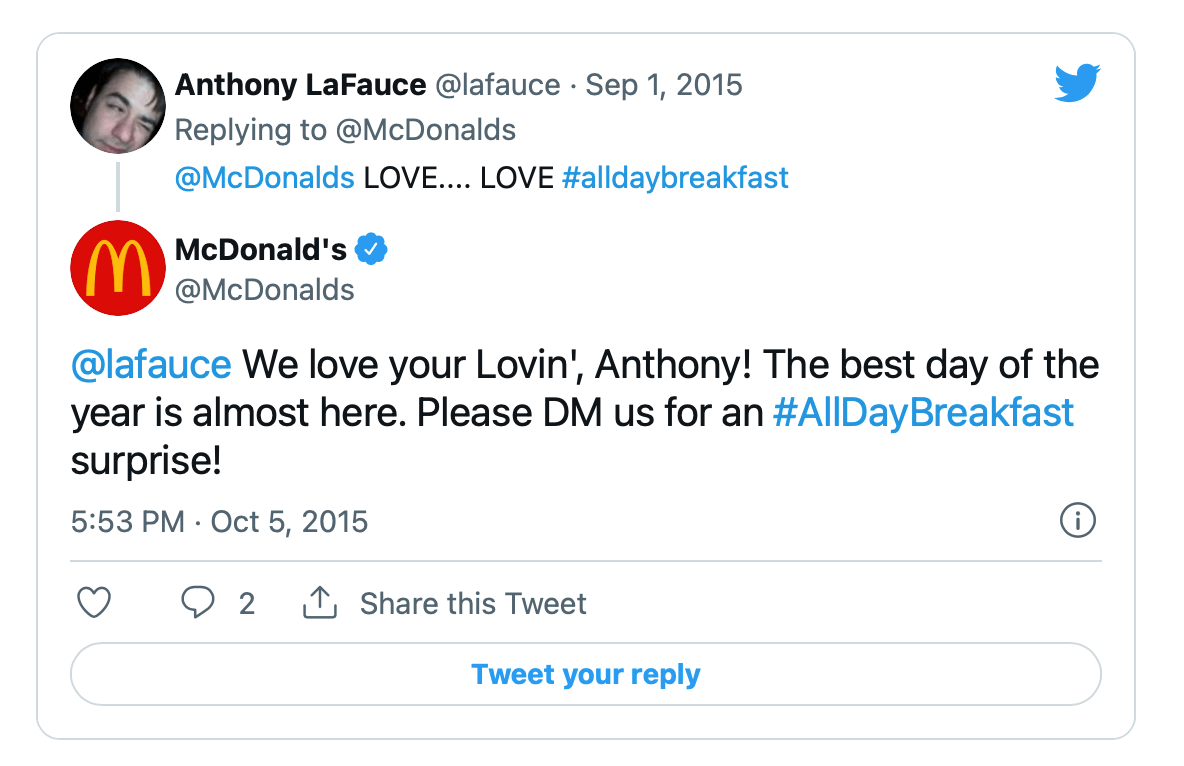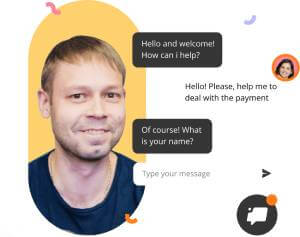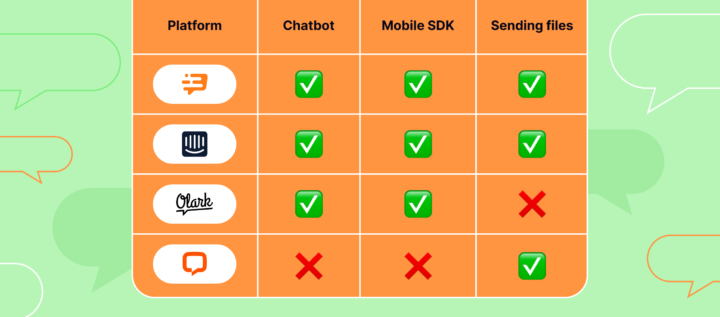What is customer focus? Check whether your company has it

While 80% of companies believe that they deliver great experiences, only 8% of customers share this opinion.
Many businesses are all eyes on competitors, not customers. And these are different things. Such an approach means being driven by others’ ideas, which might not necessarily reflect weak points in one’s own company.
Be an innovator, not a follower!
Find out deep insights into what it is like to have your focus on customers. Jam-packed with examples and practical tips, this guide will teach you to deliver fantastic experiences for ultimate results.
Let’s start with a short test.
Quiz: Is my company focused on customers?
Not sure if your brand meets customers’ expectations? Answer these five questions to find out how big your focus is on customer service.
- Do you emphasize customers’ importance in your corporate rules/philosophy or organizational processes?
⬜ We are driven by competition and industry trends.
⬜ We put employees’ convenience on a pedestal.
⬜ We highlight the focus on customers in our corporate culture.
- Do you have social media channels or pages where you communicate with the audience?
⬜ No.
⬜ Yes.
- How do you receive customer feedback?
⬜ We have a ‘Contact us’ page on the website.
⬜ We send emails with feedback requests.
⬜ We run social media channels where subscribers can express their opinion.
⬜ All of the above.
- Where do you get ideas for product improvements/releases?
⬜ Our team organizes brainstorming sessions.
⬜ We keep tabs on competitors’ actions.
⬜ Customers share their expectations and problems, which inspires us to develop corresponding solutions.
- What kind of incentives do you use for your customers?
⬜ Discounts and personalized offers.
⬜ Welcome bonuses.
⬜ Exclusive content (PDFs, tutorials, etc.)
⬜ All of the above.
⬇ The results of the test can be checked at the end of this article ⬇
Most likely, while reading it, you will guess what the correct answers should be.
Thanks! Now check your inbox.

Meanwhile, we start by explaining what being customer-focused means.
What does ‘Customer focus’ mean?
Before getting down to the practical side, it’s essential to define customer focus.
The customer focus strategy means prioritizing clients’ needs. In companies following this approach, teams are dedicated to improving client satisfaction and building lasting customer relationships.
There is a typical solution for this case, ─ evaluate metrics and boost customer satisfaction. But you cannot just leave all the responsibility on the customer support department.
Putting clients first should be a core value in your company. It allows customers to enjoy the experience through each step of their journey.
A customer-focused approach is based on:
- Being honest in advertisements and marketing campaigns. Worthy companies don’t make empty promises. Instead, they answer customers’ questions about products’ advantages and downsides openly.
- Transparency of pricing formation. Although this information is rarely publicly available, customers do have the right to know what kind of value they get by paying money to you.
- Easy sales cycle. Ideally, the path to obtaining a desirable product or service should be simple: Customer gets to know it → Contacts the company with questions/inquiries → Buys and uses it. Fair businesses don’t strive to complicate sales by additional requirements, vague discount conditions, difficult client onboarding, and complicated subscriptions.
- Product/service itself. Quality is the king. Satisfied clients are much more likely to return.
What is customer focus? Is the way of thinking, the core value of a company and what it makes customers feel about your services
According to Salesforce’s “State of the Connected Customer” report, 73% of customers want companies to understand their needs and expectations. But only half of the respondents are sure businesses do so.
Is your company among client-focused ones? Let’s look at the common signs of caring businesses.
Signs of a customer-focused company (with examples)
No loud words about dedication and philosophy. We showcase real-life examples for you to understand how a client-oriented approach works in different spheres.
Customer focused company reacts to users’ feedback
No matter what you do, healthy criticism is essential: it helps you see what was hidden from your eyes.
Have you thought about the possible drawbacks and limitations of your services or products? Maybe your clients lack one particular feature or means of communication to have their experience improved?
Staying open to feedback is good. Encouraging clients to share their opinion is even better!
You don’t need to invent a bicycle — just let people speak. They will generate tons of ideas on how your business could be refined.
Example:
A good case in point is McDonald’s, that’s known for considering customers’ comments. In 2015, they introduced All-Day Breakfast after receiving feedback on social media. People suggested it would be great to order breakfasts and welcomed the new service with positive twee regardless of the hours.
The company decided to maintain a customer approach and rolled out easy-order kiosks mode to save customers’ time.
Later, the Uber Eats delivery service appeared.
Customer focused company doesn’t modify the product. It changes customer experience
Focusing on customers does not always simply make drastic changes in your services or products.
Designers at GE Healthcare once faced a challenge: they realized that kids dreaded the company’s magnetic resonance imaging (MRI) systems. About 80% of young patients needed sedation before scanning. However, redesigning the expensive machines was not a way out.
Instead of making constructional changes, they transformed the medical procedure into an adventure story for children. To make scanning ‘more fun,’ they applied colorful stickers to the surface of the machine.

Operators, in their turn, received a script to lead their patients through the adventure. Kids were offered to head on a trip on a pirate ship or explore the Universe in a spaceship.
As a result of the redesign, the number of patients needing sedation has decreased, and their satisfaction score reached 90%.
Community is the key to loyalty
One more sign of a client-centric brand is its striving to build a community and see how to serve customers.
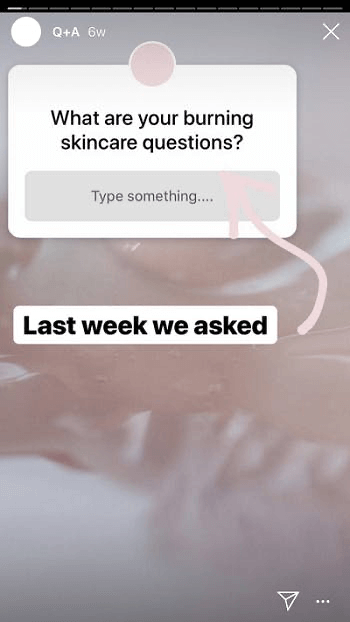
Lots of businesses around follow the lead of make-up brand Glossier. So they develop an active community on Instagram to get feedback and drive product development. Previously, the brand founder Emily Weiss used such a customer engagement strategy in the Gloss blog.
The beauty fans of Glossier are involved in the process called co-creation. Basically, the company fetches insights through users’ comments, questions, and Q&As with Emily Weiss.
That helps the beauty brand craft more relevant and targeted products. The audience, in its turn, feels appreciated and listened to.
Read also: Find out the best Intercom alternatives and Drift alternative
Customer focused company finds room for improvement
One of the best customer focus examples is the Hilton hotel network. It has set industry standards for years. Even though it existed for decades and has a thought-through client incentivization system, it keeps evolving the proprietary Honors reward program.
The program worked perfectly well. But in 2018, Hilton updated it to let customers earn more points with every stay. It introduced the ‘Elite’ status for loyalty, as well as rollover nights.
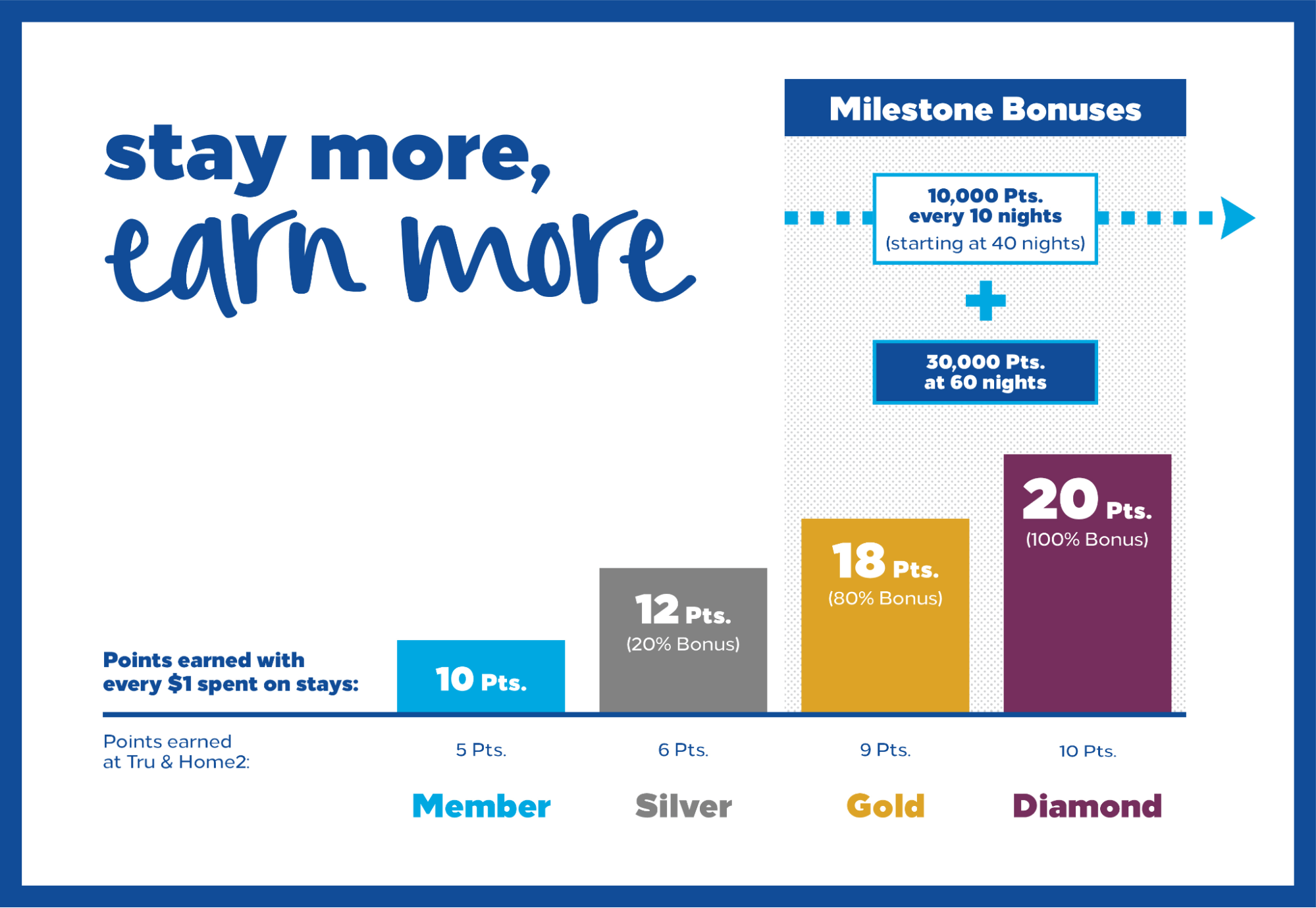
What motivated them to do so? They are chasing perfection, and the clients’ feedback helps them continuously improve the overall experience.
By the way, Hilton’s client-centered approach is also realized through its pricing policy. They offer clients more flexibility for a slightly higher price, which helps them meet demands and expectations. Judging by reports, this strategy works: it generated a 20% increase in bookings in 2018.
Customer focused company keeps up with industry trends
Widely known for delivering unbeatable customer experience, IKEA never rests on its laurels. It finds ways to improve the sales process.
Their online constructor has long been an industry standard, but progress does not standstill. Recently, the Swedish home retailer released an app for immersive user experience: IKEA Place presents them with Augmented Reality.
How does it work?
Imagine you need new furniture but don’t know how it will look in your interior. With the IKEA Place app, you can furnish your room with 3D models of IKEA pieces in your room — all done through your smartphone’s camera.

Let’s not forget that brick-and-mortar stores are no less fun. Customer journey takes place in stylishly furnished and curated spaces. In addition, they can visit a food court and enjoy famous meatballs, while families are offered complimentary childcare.
Read also:
👉 How to use lead generation chatbot for your website
👉Lead nurturing platform for your revenue growth
👉 12 types of marketing nurture campaigns
The happier your employees — the more satisfied customers
93% of employees would stay at a company longer if it invested in their professional development (LinkedIn’s 2018 Workforce Learning Report)
Training of workers and improvement of working conditions are essential. Motivated employees can do much more for customers. That’s why investment in staff is very likely to pay off.
Here are a few examples of the best customer engagement strategies companies can keep their employees (and, consequently, end-users) satisfied and engaged:
- In September 2021, Amazon announced that it will invest $1.2 bln by 2025 in the education and training of 750,000 hourly employees in the US.
- Similarly, in 2018, McDonald’s announced a $150 mln investment in a 5-year plan to provide 400,000 US restaurant employees access to its global Archways to Opportunity program. It sponsors the education of McDonald’s staff and their family members.
- In October 2021, Elon Musk tweeted that Tesla headquarters will move to Texas from California. Among the reasons — lack of affordable housing for employees, high taxes, and costly living.
Zappos went a little further with that. They believe that having efficient support and sales teams is crucial for staying a customer-centric business. This is why all employees enjoy a significant level of flexibility. No worker has a particular title or duties. They act as a part of the team to bring some value and think about how customer experience can be improved.
One more proof that Zappos focuses on customers is their Customer Research group. It applies various methodologies to reveal the actual needs of clients. They use surveys, usability testing, chatbot platform, and in-depth interviews to get a wholesome picture of the customer.
Customer focused company wants to know what customers like
One more good example of a customer service-focused company is Warby Parker. This eyeglass seller runs a chatbot that asks visitors questions based on what they are searching for and helps find the right product in a few seconds.
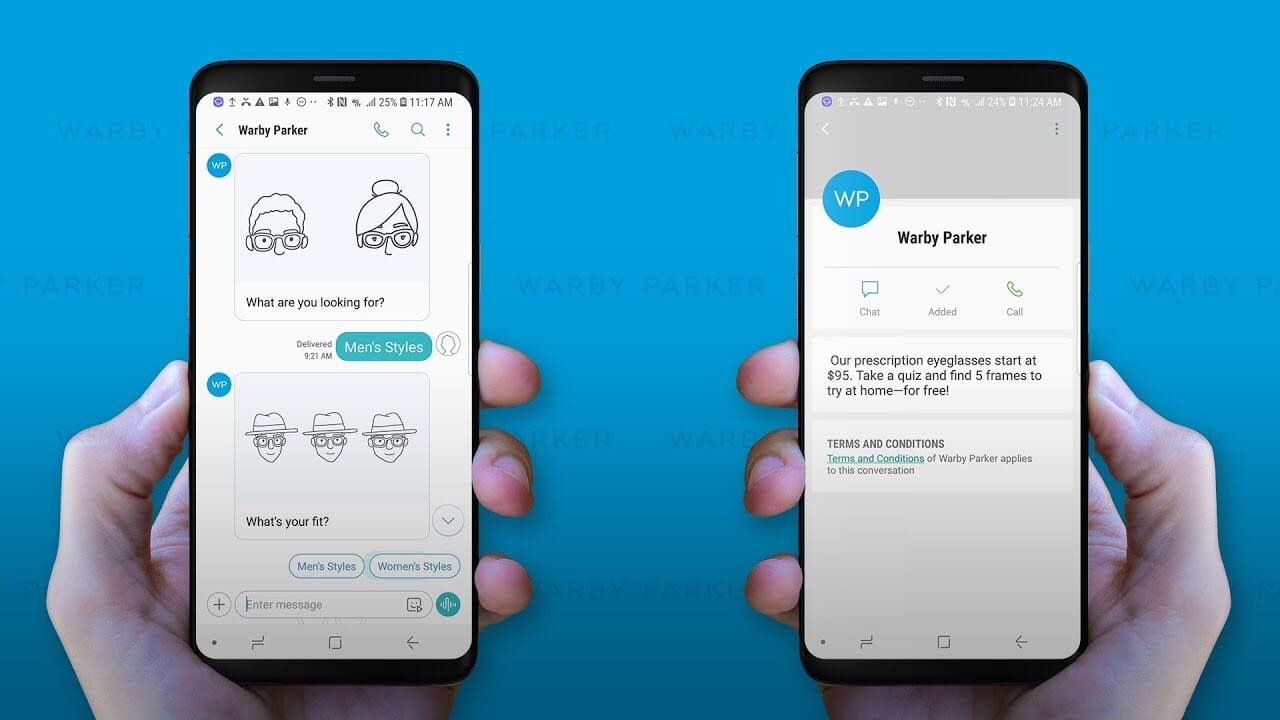
Besides, the chatbot allows the company to gather valuable customer insights.
Why is this approach efficient?
- They help visitors in product adoption and finding quickly.
- They find out which products and features appeal to clients.
- Chatbots fetch valuable customer data and help to create the portrait of an average customer.
Customer-focused company introduces customization options
While professional designers are developing each product, let’s not forget that customers know better what they want. The possibility to customize a product, be it a pizza or sneakers, is invaluable.
And Adidas knows it.
The globally acknowledged shoemaker is not just focusing on the customer — it allows them to create a product the way they like. They offer two customization options:
1) buyers can write anything they want on shoes;
2) favorite shoe styles are available in 20 different colors!
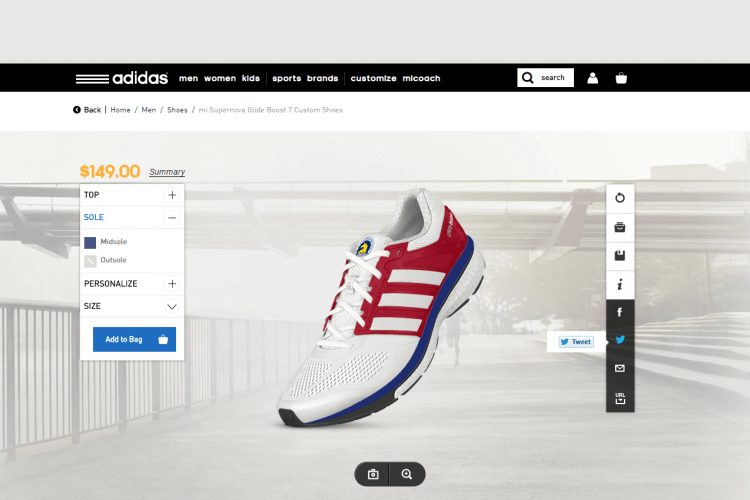
This sort of hyper-personalization has lots of benefits:
- Increased brand popularity;
- More mentions in social media;
- The more straightforward decision-making process for customers;
- More sales are forced by word of mouth.
By the way, Adidas also features a strong product recommendation engine. It comes up with solutions based on previous purchases, psychographic and demographic data. Besides, the section ‘Others also bought’ increases the effect of the Social Proof, which drives more sales.
How to become a client-focused company? An efficient customer focused strategy
If you’re competitor focused, you have to wait until there is a competitor doing something. Being customer-focused allows you to be more pioneering.
Jeff Bezos
How to keep focusing on customers and deliver the services they expect? Here are pro-tips that have been continuously used in large companies.
1. Build trust with your employees
One good example of such a relationship with customers is SidelineSwap, which helps athletes buy and sell used sporting equipment. Their CEO, Brendan Candon, realized that athletes are concerned with finding a trustworthy seller. He focused on problems that were the most frustrating for customers.
For building trust, employees discussed recurring themes. They discovered the weak points of the customer journey to improve.
So far, this approach works well for Sideline Swap. Owler reports that Sideline Swap produces more than $1 million in annual revenue.
How exactly to build trust with customers?
- Provide top-notch service. It shows that you care and want clients to get back.
- Share positive reviews and testimonials. This is a basic form of interaction with customers and helps to build relationships quite efficiently.
- Be honest and transparent. Keep up with the words you give. You should understand the responsibility to your clients and strive to deliver the quality you promise. There’s no point in loud advertisements — just do what people expect.
- Ask for and act on feedback. Encourage your audience to leave comments, ask questions, and express their concerns. Let them react to your Instagram stories, send emails offering them to evaluate your services, or integrate pop-ups. Any sort of criticism or offer may give you a hint on what clients want.
- Be reachable. Customers should be able to contact you immediately at any step of the sales funnel. If they fail to get in touch with you, consider them lost.
2. Solve specific customer needs
Many great businesses were found as a response to some flaws or drawbacks in the industry.
For instance, in 2017, Sarah Nahm built her company called Lever. It was created to solve the problem of Silicon Valley companies failing to attract and retain employees.
The Liver tool helps them identify top talents which are most likely to stay in the company. Lever boasts around 1,300 active clients and has been able to raise over $62mln from investors.
You can identify nagging issues by doing your research on the audience. Which matters to pay attention to?
- Lack of specific tools or features that would simplify the user experience.
- Unbalanced quality/price of certain products — this is a gap that you could fill in.
- The insufficient quality of competitors’ services.
- High-demand and low offer for some products or services.
The rule is simple: if you can do something better than others, use this opportunity!
Read also:
- Attract customers with these 24 ecommerce lead magnetsThe 7 Key Email Marketing Metrics & KPIs You Should Be Tracking
3. Use customer service tools
If you have been using some customer service software, you know how well it boosts the efficiency of managing support processes. Thanks to edge-cutting technologies, the customer support team can focus on what matters and prioritize tasks.
Better organization — more processed requests.
There is a list of must-have customer service technologies to empower your customers:
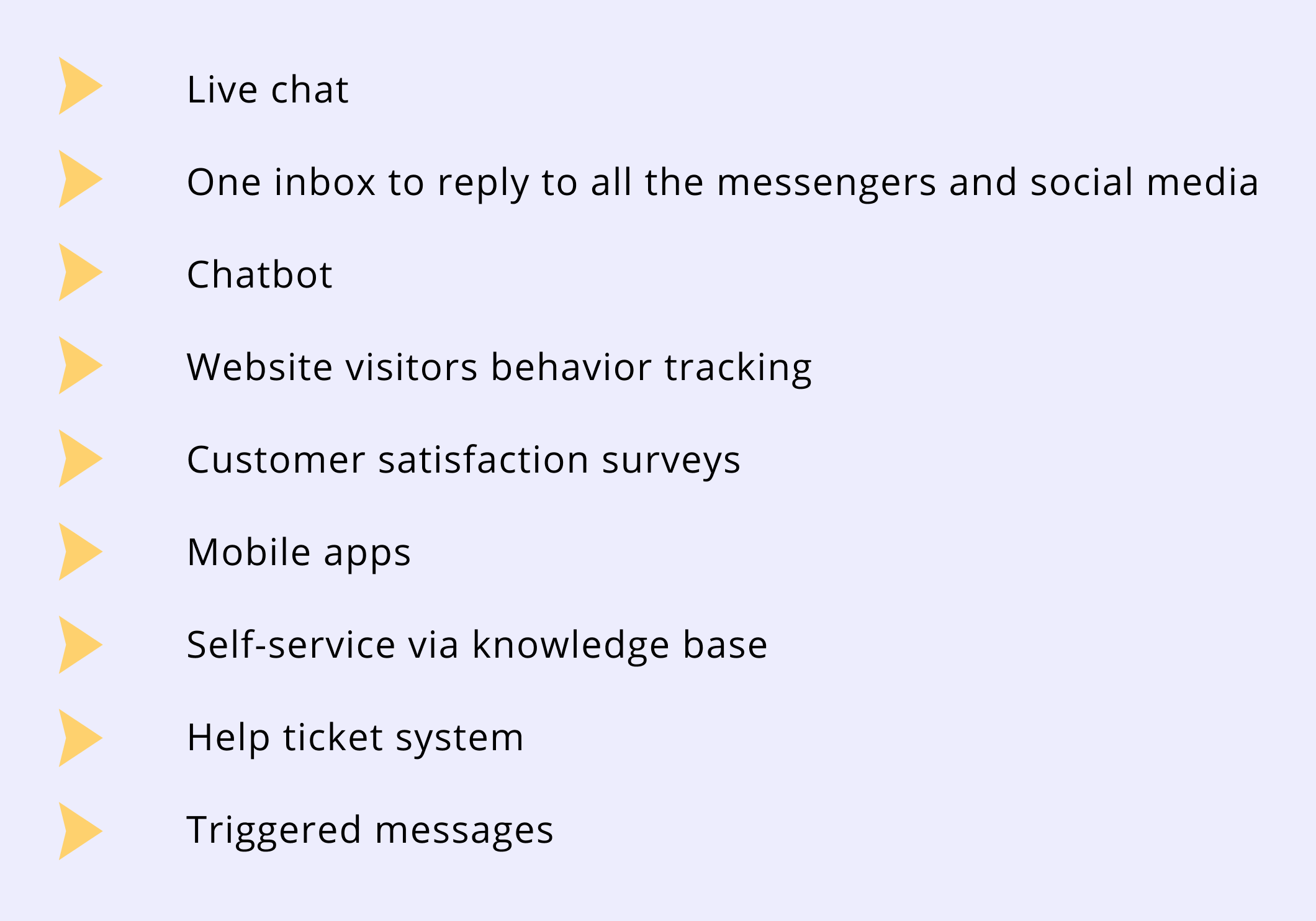
Good to know that there are all-in-one solutions that include all of the above elements, like Dashly.
The following metrics should be taken into account when analyzing customer behavior and business processes:
- Customer satisfaction score (CSAT) — used to evaluate customer support experience, usually after the specific issue is resolved.
- Customer lifetime value (CLV) — refers to the total amount of money a customer is expected to spend with a specific brand.
- Net promoter score (NPS) — measures customer loyalty.
- Customer retention rate (CRR) identifies the percentage of customers the company has retained over a specific time.
- Customer churn rate — the opposite of CRR, customer churn represents the number of customers lost.
4. Look for ways to improve your products
The best way to improve business is to keep working on the quality of services and products you offer. No need to follow competitors’ lead — try to make your product better than yesterday.
If you have no ideas on how your current products might be improved, encourage customers to share feedback.
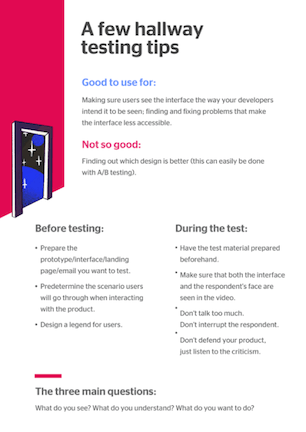
Here’s how Guru company handled that:
We use support channels to encourage an open feedback loop with customers. Guru is a partner to cultural institutions, not a vendor. Therefore, the company can adapt its products and optimize the client’s success
— noted its CEO Paul Burke.
5. Make the customer a part of your brand
Above, we have mentioned Glossier’s example: they communicate with customers through responses to Instagram stories, Q&A sections, and comments. That allows them to get fresh ideas for product innovations and make the audience feel involved.
Emily Weiss, Glossier’s SEO believes that her success was reached thanks to ‘making customers feel like part of the brand’.
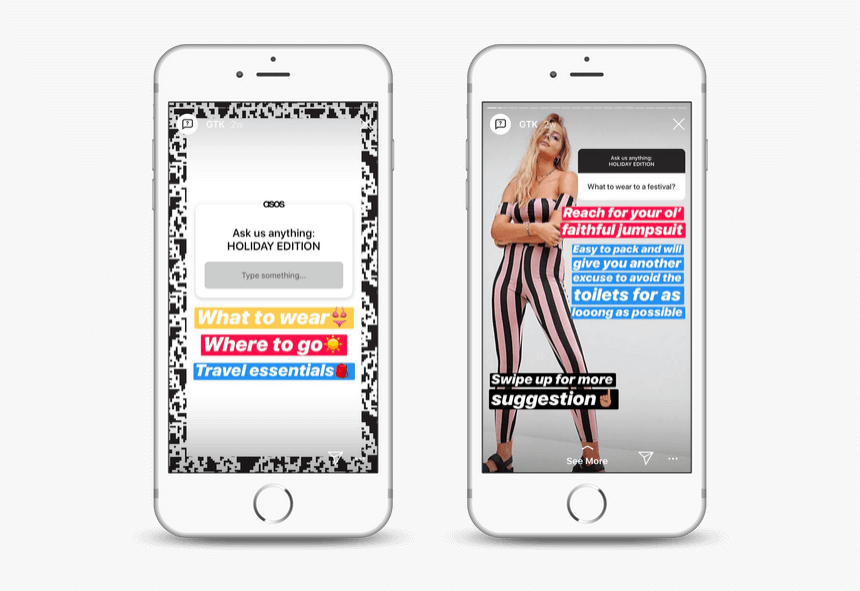
She also noted that 60% of Americans rely on peer-to-peer recommendations when searching for beauty products. That’s why it’s great to have customers by your side — their friends and acquaintances are more likely to trust the newly discovered brand. So include your customers’ voice in your products and your content, and your audience will become loyal as never before.
Read also: 15 customer engagement platforms to boost your website conversion.
6. Always be there for your clients
Although, making all the responsibility fall on your customer support team’s shoulders is no good. They still should be able to provide a timely reaction.
It is vital to address clients’ issues as soon as possible. But, what’s even more important — they shouldn’t treat the process of communication with customer support as a burden.
In many companies, the process is too complicated. Clients have to find contacts, compile emails and wait for responses. Try to make it simpler. There are no particular rules to follow — just think about how you can make the process of problem-solving more efficient in your company.
For example:
- Place ‘Need help? ’ buttons on different points of the customer journey.
- Make sure the ‘Contact us’ section is easy to find.
- Provide convenient options for customers: solving a problem via live chat is way faster than waiting for an email.
- FAQ and tutorials can be of much help when visitors face some typical issues.
- Launch chatbot. It will answer visitors’ questions while your customer support agents are busy or have time off. Hence, clients will get necessary information immediately, which improves user experience by a mile.
Don’t forget to support your agents, too. Invest in their training, encourage their career growth, show empathy, and provide some bonuses as a way of acknowledging their importance.
Read more
- 10 Best Live Chat Software for Customer Support
- 10 Best Customer Service Chatbot Platforms to Level Up the Work
- How to create a user journey online map for your online school students [4 free templates]
- Increase Customer Support Efficiency With 15 Best Knowledge Base Tools
- Chatbot Guide: What can a chatbot do for your customers 24/7
7. Hire a customer-focused advocate
One of the most exciting customer-focused strategies is to hire a CCO (Chief Client Officer). This person will be the voice of the customer and will make sure that clients’ expectations are not failed.
What do CCOs do?
- They use data and research to figure out users’ needs.
- They help with the design of products and processes for reaching higher customer satisfaction.
- They identify where teams lack customer service focus.
As a result, their efforts bring higher sales, more customer trust, and lower bounce rates.
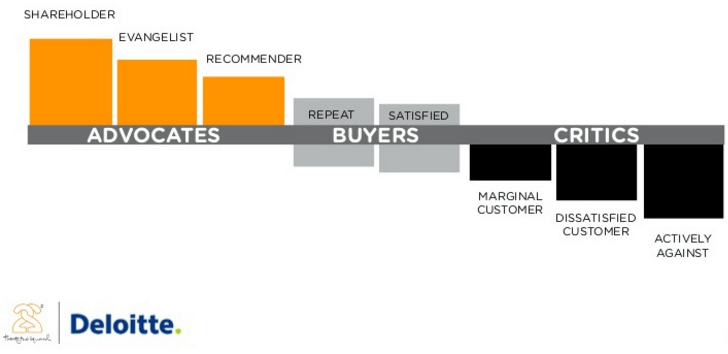
By the way, brand advocates might be among your loyal customers, too! Where to find them? Encourage buyers to leave feedback on your website or social media. You can also ask some of them to be your ambassadors: collaboration with devoted users can be very productive.
8. Teach and train your employees
You cannot become a customer-focused company overnight. This is a part of corporate culture that should be bred over time. These strategies that may bring you long-term success:
- Keep your employees informed about progress updates. You can share information in corporate chats or via regular Zoom calls.
- Encourage new ideas and feedback. Being at the heart of all processes, your workers might know better what clients need.
- Provide access to training modules, courses, and literature created to teach customer focused culture.
- Make sure your employees know the basics of customer journeys and keep improving their communication skills.

9. React to the changes in your industry
The pandemic has taught restaurants that it’s not enough to cook well. They should be able to deliver foods to keep businesses afloat. The ability to adjust is becoming as crucial as never before. If you don’t keep pace with your industry, you will be on the losing side.
Sometimes, changes should be drastic, and you either accept them or get out of business.
A good case in point is AeroSafe biopharma logistics company. Due to the change of biopharma packaging in the sphere, its CEO Jay McHarge faced a dilemma: he could leave things as they were or accept the challenge.
He took the second option and even managed to switch the company from packaging to delivery logistics. Their renewed service benefited clients, which helped AeroSafe reach $11 mln annual revenue.
Read also: Capture emails from website visitors with Pop-ups
10. Improve and polish the customer experience
As we have already noticed, customer experience is the critical point for their relations with the brand. Therefore, you should search for ways to refine it. Brian Halligan, co-founder and CEO of HubSpot, a highly customer-focused organization, shares his golden rule:
Your customer experience has to be 10 times better than your competition.
To accomplish this goal, HubSpot uses various practices:
- It provides self-service support documents along with 24/7 support channels;
- Instead of waiting for the sales rep’s response, customers can find all required information on their own using online materials;
- Dedicated sales managers are available for some clients.
The company even has a Customer Code that mentions great rules and practices — something like that can become a part of your corporate culture, too. This approach allowed HubSpot to increase its revenue by 39% in 2016-2017.
11. Ask for customers’ feedback
Following metrics helps you get a broader picture of how visitors behave on your website. However, there is a better way to figure out how they feel about your company. Just ask them directly.
Surveys help companies gather valuable data and transform it into a better customer experience on their website. They allow revealing particular customers’ pain points. By receiving regular feedback, you can keep improving your sales numbers.
Don’t be afraid of receiving negative comments — they are the most crucial sources of helpful criticism. Don’t forget to respond and let clients know they are always backed up. Next time, they will be more likely to address their problems.
Read also: how to find respondents for a survey or customer interview
12. Prioritize customer retention
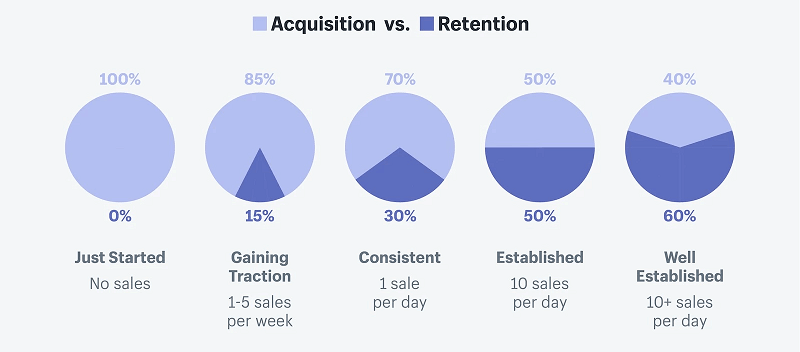
It’s not a secret that keeping old customers is more accessible than attracting new ones. Hence, you should be tracking the indicators of customer retention.
Keep tabs on:
- customer churn;
- repeating purchases;
- existing customer growth rate;
- the overall efficiency of the relationship-building process.
With the help of these metrics and user tracking on website, you can track and predict your customers’ needs and react quickly to make the required changes.
At the same time, it should be noted that many entrepreneurs struggle to be focused on customers because of the abundance of customer data available. If this is your case, you should lack the right tools for analysis.
Pro tip: To retain client focus, sales departments should change their mind about sales. Tracking pipeline and revenue streams are important, but there are many more critical points to think about. Are customers’ pain points addressed sufficiently? Does the service or product deliver true value?
Some customer-centric companies even introduce so-called full company support. That means marketing, engineering, and product are taught about common client objections and complaints.
Lastly, there is another great way to boost customer satisfaction and retention. By aligning sales and marketing teams, you can develop excellent marketing strategies. That means being able to track and manage revenue opportunities simultaneously. The union of both departments helps through the entire cycle, from thinking oner the best way to collect emails to customer retention. This sort of collaboration can be simplified with eCommerce tools and a CRM.
Read also: The North Star Metric and How Can This Lead to Success
Closing thoughts
No matter which industry you’re operating in, the competition level must be pretty high. If you want to outperform rivals, don’t look at what they do — track your customers’ expectations and wishes instead. There’s a myriad of ways to improve customer experience and make people really want to come back again and again. Hopefully, the examples above have inspired you to make some positive changes in your company.
‘Customer focus’ quiz results
When you are aware of how customer-focused companies act, you have probably guessed that the last answers in each question were supposed to be correct ones.
Back to the quiz to check the results.
Thanks! Now check your inbox

FAQ
This is a part of corporate culture that’s based on prioritizing customers’ needs. Such an approach means a business is dedicated to raising client satisfaction and building long-lasting relations with clients.
The list of strategies based on customer focus is immense. Major rules boil down to:
― Encourage and react to their feedback.
― Come up with bonuses, special offers, exclusive content.
― Maintain communication in social media and keep the audience involved.
― If you cannot change the product or service, try to refine the customer experience.
― Provide fast and efficient customer support.
The biggest mistake is to be guided by competitors’ actions — that limits the company’s opportunities. Moreover, ignoring clients’ inquiries, reviews and complaints will eventually lead to losing a loyal audience.
There is a list of must-have customer service technologies to empower your customers:
― Live chat
― One inbox to reply to all the messengers and social media
― Chatbot
― Website visitors behavior tracking
― Customer satisfaction surveys
― Mobile apps
― Self-service via knowledge base
― Help ticket system
― Triggered messages
Read also:
- Customer VS Client — making the difference clear
- Why eCommerce and omnichannel are inseparable?
- How to qualify lead within sales and marketing teams
- Ultimate guide to inbound lead qualification in EdTech marketing
- How to Qualify and Collect More Leads with Lead Bot?
- How BANT sales process can help you get qualified SQL in 2022
- How to implement user tracking on website: guide, tactics, and tools
- Top 10 user activity monitoring tools: tracking features, price, cons and pros
- Top 20 best website tracking tools for effective work with visitors


